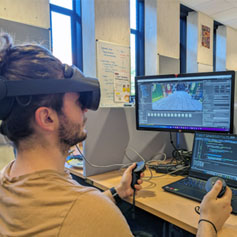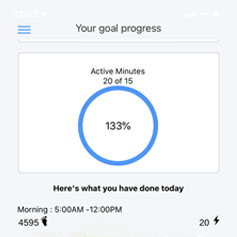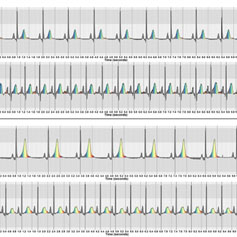
Human computer systems
The Human Computer Systems Group focuses on understanding how users interact and behave in relation to complex technology systems and how these systems, through their design, technology and infrastructure, enable users to interact with them.
Our researchers
The HCS is an interdisciplinary group made up of a variety of academics, researchers and students (accounting for around 50 members), all of which have differing skills and research interests, but all of whom are interested in human interaction in real and virtual worlds in domains ranging from the health service and the animation industry to the humanities. We collaborate with industry (the BBC, AstraZeneca), the public sector (NHS, museums and councils) and charities. To support the work conducted within the group, several facilities, such as a User Lab and library are provided. We actively engage with the scientific community through our membership of conference committees (e.g., The Web Conference), and journal editorial boards such as ACM TACCESS, ACM TWEB, the International Journal of Human Computer Studies, IEEE Pervasive and PACM IMWUT.
Further details about the Human Computer Systems group can be found in the research explorer.
Our research focuses on the following areas and their intersections:
-
User Modeling, Adaptation and Personalisation
We engineer the infrastructure to collect and analyse human generated data and apply data science techniques to acquire a better understanding of human behaviour and their interactions with complex interactive environments. With this understanding, we devise methods and tools for evaluating the usability and accessibility of complex systems, which results in a better user experience of interactions and computer systems.
-
Mobile and Ubiquitous Computing
We engineer and study the computing systems that blend seamlessly into our everyday lives – from the smartphones in our pockets, to the smart speakers and other devices in our homes, and the sensors and digital displays in our workplaces and public spaces. We develop novel solutions to overcome the challenges of in-the-wild system use, and understand how these devices are changing the way we think and behave.
-
Digital Health
We organise medical knowledge with knowledge representation artefacts, assess decision-making with complex information such as physiological signal data (e.g. ECGs) and medical dashboards, model the progression of physical activity using wearables and conduct digital phenotyping studies with Parkinson’s and diabetes patients.
-
Computer Graphics
We study Computer Graphics techniques and scientific computing with a focus on Virtual Reality and immersive environments as well as realistic rendering and simulating how light interacts with complex materials (e.g., cloth, animal fur, and human skin). We develop efficient solutions for both offline and real-time rendering for a practical virtual experience that has applications in the entertainment industry such as games and movies, medical imaging, and psychology.




